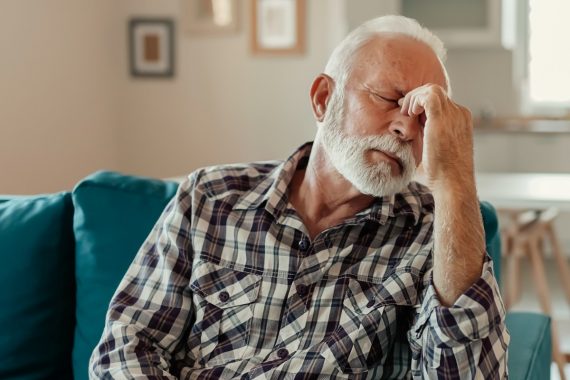Over two-thirds of non-hospitalised patients infected with Covid in the first wave of the pandemic developed long Covid, according to a new study.
In the first study to directly compare patients who were hospitalised or well enough to remain at home, researchers found fatigue to be the most long-lasting and prevalent symptom.
The study of more than 650 patients in Spain found that 59.7% of hospitalised patients and 67.5% of non-hospitalised patients had at least one post-Covid-19 symptom two years later.
While this was in a non-vaccinated population who were infected with the initial strain of Covid-19 it supports the hypothesis that severity of initial infection is not a risk factor for long Covid, they said.
But they said the prevalence of breathlessness two years after infection was small in both groups, even though a more common symptom in hospital patients initially, and had decreased as time passed.
Writing in JAMA Network Open, the researchers concluded: ‘Current evidence supports that long Covid will require specific management attention independently of whether the patient has been hospitalised or not.’
The latest figures from the Office for National Statistics on long Covid published earlier this month show an estimated 2.1 million people or 3.3% of the population experiencing self-reported long Covid symptoms that have lasted more than four weeks.
Of those, 507,000 had a Covid infection more than two years ago and 333,000 say their ability to undertake their day-to-day activities has been limited a lot.
Professor Fergus Gleeson, professor of radiology at the University of Oxford who is currently one of those doing government-funded trials on long Covid said: ‘I think this paper offers some hope to the post Covid community, in that some of their symptoms do appear to improve over time.’
Professor Daniel Altmann, professor of immunology at Imperial College London, said if the figures found in the study were extrapolated to all Covid patients the numbers would be huge and it was important to remember that those infected at the start of the pandemic were in a different situation when many who were forced to stay at home were actually very unwell.
But he added the study suggests we could have been ‘undercounting’ long Covid.
‘For every person who struggles to see a GP and maybe get a referral to long Covid clinic, how many are there who saw no point, or just brushed their new symptoms aside with a bit of “ah well, we’re none of us getting any younger”.
‘Counted or not, the long-term impact on our health, our workforce, our economy, our quality of life will be huge for some years to come,’ he added.


















READERS' COMMENTS [1]
Please note, only GPs are permitted to add comments to articles
Lamenting that most LC patients have not sought help/referral from their GP is missing the point. Since LC numbers are clearly massive, many many millions in fact, and there remains no effective treatment, encouraging these unfortunate people to seek non-existent medical help is cruel to them and disastrous for us.
It’s bad enough now completing the huge list of (usually unnecessary) compulsory pre-referral investigations and filling in the time-consuming form, (only for the patient to face a huge wait, then to discover there is no magic treatment at the LC clinic.) They land back on our doorstep, angry and exhausted, demanding to know what we’re going to do next.
Encouraging the missing millions to “see their GP” may please the statisticians, but at a time when the NHS is on its knees, appointments are at a premium, and effective treatment is an illusion, surely a bit of old fashioned stoicism is no bad thing.
With LC clinics being quietly decommissioned any way, perhaps the messaging should be along the lines of “self help”, online information and LC patient groups, rather than the usual “see your GP” cop out.